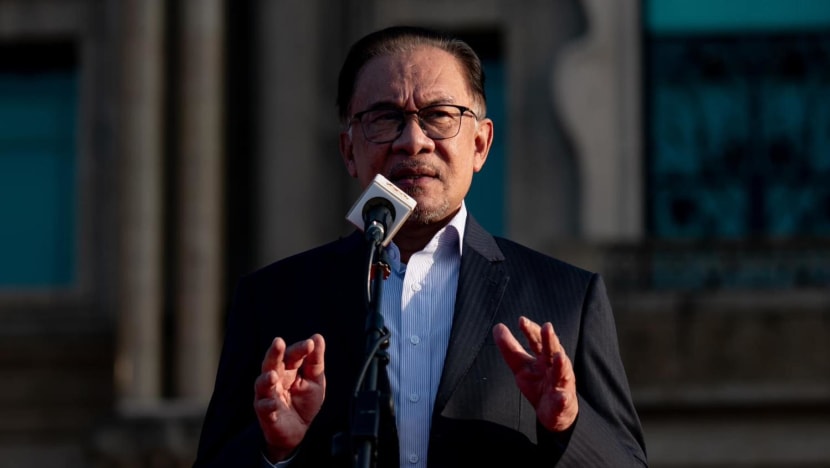100 days after taking office, PM Anwar proceeds cautiously on economic, political fronts
The next three months will be crucial for Malaysia’s unity government, as a handful of states head to the polls.

Malaysian Prime Minister Anwar Ibrahim delivers a speech to civil servants at the Monthly Assembly session on Jan 16, 2023. (Photo: Facebook/Anwar Ibrahim)
KUALA LUMPUR: If there is anything Malaysian Prime Minister Anwar Ibrahim can stake claim to as a major achievement after 100 days in office, it is the outmanoeuvring of his political rivals that has helped the country snap out of a protracted political funk that lasted almost three years.
Unlike Malaysia’s last three administrations which were more absorbed in surviving politically, his unity government remains intact.
His Pakatan Harapan (PH) coalition no longer needs to rely entirely on the long-established United Malays National Organisation (UMNO) to hold on to power in the lower house, because of the counterbalance provided by the political parties from the East Malaysian states of Sarawak and Sabah.
Now comes the hard part.
The myriad of economic challenges, ranging from taming high inflation to fixing the wobbly state of national finances and restoring confidence in the equities and currency markets, remain work-in-progress items on his government’s to-do list.
Mr Anwar’s performance in the next three months will determine the longevity of his government.
“His promised reforms may not be keeping with what the public expects but there is a sense that the country is moving in the right direction,” said Manu Bhaskaran, chief strategist at Centennial Asia Advisors and a seasoned observer of Malaysia.
The lull in politics may not last, warned Mr Syed Azman Syed Nawawi, a veteran political science lecturer who had teaching stints with University Malaysia and the International Islamic University Malaysia in Kuala Lumpur. “On paper, the government looks stable but there remain underlying tensions that could lead to the breakup of the coalition.”
Mr Anwar’s closest advisors, who have weekly private interactions with the premier, noted that there is a general perception that the prime minister may not be moving fast enough on the reform front. They told CNA this is largely because the government is not able to boast about any breakout policy shift apart from the mantra of promoting good governance.
“In reality, there are many changes, particularly in reforming the civil service,” noted a top corporate personality, who has been in Mr Anwar’s inner circle since the early 1990s.
Government sources told CNA that the little-publicised reorganisation in the top echelons of the country’s powerful civil service is one of Mr Anwar’s most important initiatives over the last three months.
Amid little fanfare, Mr Anwar has reassigned at least 10 top civil servants, including the secretary general of the Finance Ministry in the last three months.
He went further last month when he appointed Mr Johan Mahmood Merican, a Cambridge-educated chartered accountant who is not a career technocrat, as the new secretary general of the Treasury, signalling that he was ready to inject new dynamism with outside appointments into the cliquish bureaucracy.
Economists believe that Mr Anwar has made the right moves in dealing with the country’s economic challenges.
His economic strategy team comprising private sector personalities and civil servants headed by Mr Hassan Marican, the former chief executive officer of national oil company Petronas who also previously served on numerous international boards including SP Group, will oversee the rollout of large infrastructure projects that will be under strict public tenders. They will also suggest reforms for government-linked corporations that dominate the economy.
“This is definitely an improvement in the quality of policy making, which we saw in the recent budget that struck the right balance in efforts to reduce the deficit and enough allocations for development,” said Centennial’s Mr Manu, noting that portfolio investors are closely watching how the Anwar government will move to tackle the government's huge debt load, which currently exceeds RM1.5 trillion (US$332 billion).
What worries both economists and analysts is the political challenges facing the government.
The Malaysian political landscape that Mr Anwar now presides over is seriously scarred.
It marks the first time since independence in 1957 that power is now largely in the hands of political parties that are openly multi-racial in makeup and ideology. This is a clear break from the identity politics of race and religion that has long characterised Malaysia, which is dominated by ethnic Malay Muslims who make up nearly 65 per cent of the population.
Mr Anwar’s PH and its partners in government, which include ethnically diverse groups from the East Malaysian states of Sarawak and Sabah, now control 148 seats in Parliament. This majority gives the new ruling government a two-thirds majority in the 222-member lower house, marking the first time since 2008, when the then-ruling Barisan Nasional coalition lost the supermajority.
The opposition, which for the first time in history is made up solely of Muslim Malay political entities, comprising Parti Pribumi Bersatu Malaysia (Bersatu) and the right-wing Parti Islam Se-Malaysia (PAS), has begun campaigning that Mr Anwar’s government is not doing enough for the Malay community.
The big test for the new unity government will come sometime in June when six states, comprising Selangor, Negeri Sembilan, Penang, Kelantan, Terengganu and Kedah, are expected to hold simultaneous elections for their respective state assemblies.
The ruling coalition controls Penang, Negeri Sembilan and Selangor, while the three other Malay-belt states are controlled by the opposition Perikatan Nasional (PN) coalition.
The PH coalition would find it very difficult to wrest control of the states currently held by the opposition and the major concern is that the states it currently control could face serious electoral setbacks that would suggest further slippage in the support from the Malays.
“Status quo would be a good outcome, but a loss in any PH state will be damaging for Anwar,” said Mr Syed Azman, the political science lecturer.



















